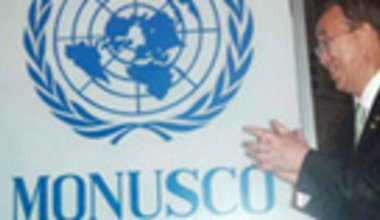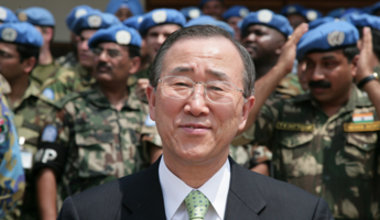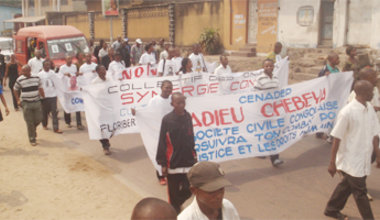Press Review
Sud-Kivu: Populations fleeing new fighting, headlines LE POTENTIEL. « Responding to the ICST (International Committee in Support of the Transition)'s request for a clear verdict on Nkunda and Mutebutsi case, the Government has opted for a military solution», the paper says highlighting « the deep rift between the Congolese living in eastern DRC where ethnical venom is deep-rooted» alluding to the 30,000 Kinyarwanda-speaking Congolese who fled three weeks ago following the advance of the DRC Armed Forces (FARDC) and sought refuge in Numbi, Shanje and Chebumba villages, held by Laurent Nkunda and his troops. « It is also reported that between 4,000 and 5,0000 non-speaking Kinyarwanda Congolese fled Kalehe to the South to join the FARDC positions», the paper says. This shows « to what extent the political and military conflicts in Kivu are fuelled by ethnic rancours which creates reflexes for the survival, likely to durably inflame the whole region unless the transitional rulers take appropriate steps to reconcile the clashing communities and restore confidence among them», the paper says.
« Continuing insecurity and animosity in eastern DRC ended up opening the International Community's eyes on the weakness of the arms embargo imposed in August 2003 », the paper writes in its editorial entitled For an effective embargo. LE POTENTIEL recalls that the UN Security Council has unanimously extended arms embargo on eastern DRC for one year and indicates that « appropriate steps are still under consideration for a radical change of MONUC's mission into a peace enforcing one». The paper hopes that the United Nations Supreme Organ will adopt a firm attitude « in order to make the embargo more effective».
FORUM DES AS does not share this opinion and denounces the renewal of weapons embargo on eastern DRC. For the paper, Eastern Europe « has taken advantage of the arms embargo on eastern DRC», to reinforce Rwandan and Ugandan military capacities, stressing that the DRC National Unity Government has been making efforts to put in place an integrated army. « While the process is ongoing, we do not see why the embargo must continue to be implemented when the country is faced with security problems both inside the country and along its different borders shared with nine countries», which the paper regrets. It says that weapons embargo on the DRC «will give a free rein to Rwanda and Uganda whose military supports from Eastern Europe have been reinforced» and will push them to continue arming « the different militia groups in their pay with a view to destabilising the DRC and exploit its mineral resources for their Eastern European's sponsors». The paper holds that « stability will be restored to the region when the DRC have a strong army and is well equipped to defend its borders».
UN Security Council extends MONUC mandate for two months, announces LE PALMARES on its front page. « This is to enable the UN Secretary-General to submit a definite report on the DRC situation to the Security Council between the 10 and 15 August, including the new developments in Bukavu. (') The mandate could be modified in light of this report» so that MONUC may correctly fulfil its mission, the paper highlights.
Nationality: the confusion is already at its height in the East, headlines the same paper. The UN radio in DRC is quoted as indicating that the 280 Rwandans found refuge in Bunyakiri, Sud-Kivu have manifested the desire to return to their home country, i.e. Rwanda. « When they reached Ruzizi borders, they introduced themselves as Congolese seeking refuge in Rwanda », the paper writes. Under an agreement reached by the High Commissioner for Refugees and Rwandan authorities, the people were authorised to enter Rwanda « as Congolese in search for asylum», fleeing «persecutions in the DRC», as declared by Kigali. « According to HCR/Bukavu authorities, there was not a single sign of persecution suffered by the people», the paper writes, indicating it is apparently clear that Rwanda is opposed to the return of its nationals. « The DRC must therefore seriously handle the issue relating to the double nationality» to avoid a « drift that would not be easy to control».
The heads of religious communities commit themselves to prepare the population for the elections, indicates LA REFERENCE PLUS. They signed a memorandum of agreement Wednesday, the paper further says, to raise the population awareness of the democratisation process after harmonising their views on the transition. For L'AVENIR, the religious communities have then trapped the politicians, since educating the population would lead them to remove of politicians' alibi in «seeking at all cost to secure government offices by means of politician obscure calculations».
« Confirming his political ambitions in Boston », Tshisekedi will stand for presidential elections in 2005, announces LE POTENTIEL, hailing the determination of the leader of the Union pour la Démocratie et le Progrès Social (UDPS) to play a fair democratic game and make the Congolese people benefit from his political experience. L'AVENIR regards him as « a man who pretends to be able to run the country alone», thereby offering no guarantee that he will be ready to accept a change of power tomorrow». The paper says that Tshisekedi belongs to the group of the Nation's Founders, presidents for life.
 ONU
ONU Nations Unies Maintien de la paix
Nations Unies Maintien de la paix



